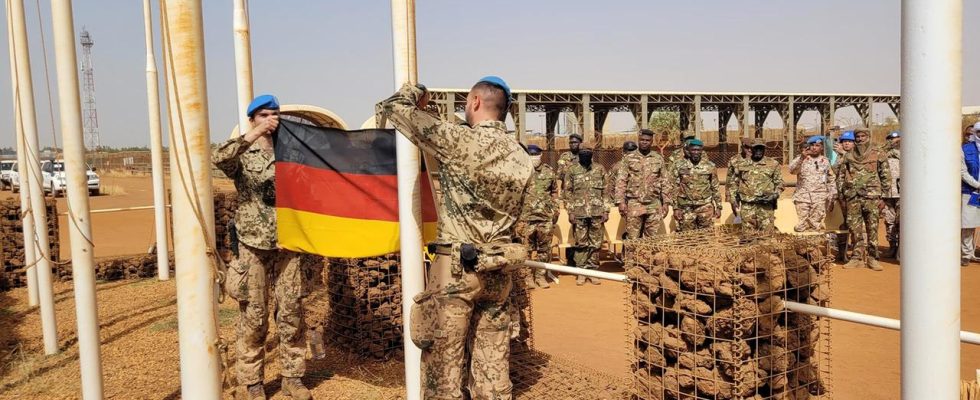analysis
The Bundeswehr’s deployment in Mali lasted more than ten years. The last German soldiers have now left the field camp in Gao. Did this mission, like the one in Afghanistan, also fail?
A bright orange sun stands just above a bright blue river: the Niger River in northern Mali. This image, which seemed almost too idyllic, was emblazoned on the logo of the last German contingent in Gao.
A logo that the soldiers also wore as a patch on their camouflage uniforms. An image of great symbolic power. It is not possible to see whether the sun rises or sets in Mali on the logo.
Bundeswehr soldiers wore this patch on their camouflage uniforms during their deployment in Mali.
The question of meaning
But the question remains as to whether the country faces a rather bleak future. And with it the question of meaning: “I say: As long as the German troops were here, we ensured a certain stability and more security for the people who are here on site.” This explained the commander of the last German operational contingent, Heiko Bohnsack, recently ARD-Interview. He was the last person to turn off the lights in the German camp, so to speak.
More or less security?
In fact, no one denies that the UN peacekeepers and the Bundeswehr created pockets of stability in northern Mali and acted like a buffer between the conflicting parties.
However, it cannot be denied that despite and during the presence of the UN troops and the Bundeswehr, the terrorist groups’ sphere of influence has not decreased, but has expanded. Mali has become more unsafe over the past ten years.
“Now with the withdrawal you can also see that a lot more is happening in the region.” This is how mountain hunter Mathias sees it, who only gives his first name for security reasons:
In my opinion, this would have happened much sooner if the MINUSMA forces had not been there. This did not combat the fundamental conflict.”
Sustainability of the mission
So the question is: How sustainable were the Bundeswehr’s ten-year presence in Mali? Because even while the UN peacekeepers were busy withdrawing in the last few months, the conflicting parties clashed again with undiminished force.
To put it simply: Al Qaeda and IS terrorists as well as Tuareg separatists on the one hand and the Malian army on the other. The Malian army that recently allowed itself to be helped by, of all things, Russian Wagner mercenaries. And prevented the Bundeswehr from being able to launch its Heron reconnaissance drones, for example.
Coup during the operation
“So, that’s the darling who isn’t allowed out.” With these words on his lips, Defense Minister Boris Pistorius walked up to the drone with the enormous wingspan on display in the German camp during his visit to Mali in April. The fact that this “sweetheart” was doomed to remain on the ground is one of numerous reasons why the question of meaning became apparent during the operation.
Mali’s military government, which came to power in a coup, bullied the French out of the country, instead increasingly relying on Russia as a partner – and then in mid-June showed the door to the UN peacekeepers with the unmistakable announcement that they had to leave the country by the end of the year .
“The government in Mali obviously doesn’t want us here anymore.” Field hunter Gianluca asked in frustration ARD-Interview fixed. “My personal opinion is that sustainability and our opportunities have been greatly reduced by the decision to rely on other countries – Russia and perhaps China.”
Is history repeating itself?
The question of meaning is one that also concerns the soldiers. But what about the future of Mali? It seems as if history is repeating itself here. The country is in danger of falling back into the situation that prompted France and then the peacekeepers to intervene in the first place in 2013. At that time, the violence escalated and the state threatened to be split in half.
“Development cooperation and humanitarian aid will hardly be possible in northern Mali.” Ulf Laessing, head of the Konrad Adenauer Foundation in Bamako, dares to make this dark prophecy, who expects the security situation to continue to deteriorate.
Even if it is still not clear whether the sun rises or sets over Mali on the logo of the last German deployment contingent. The predictions are that it will sink. What is clear is that the Germans will no longer have a say in this matter.
Kai Küstner, ARD Berlin, currently Rabat, tagesschau, December 12, 2023 7:59 p.m

